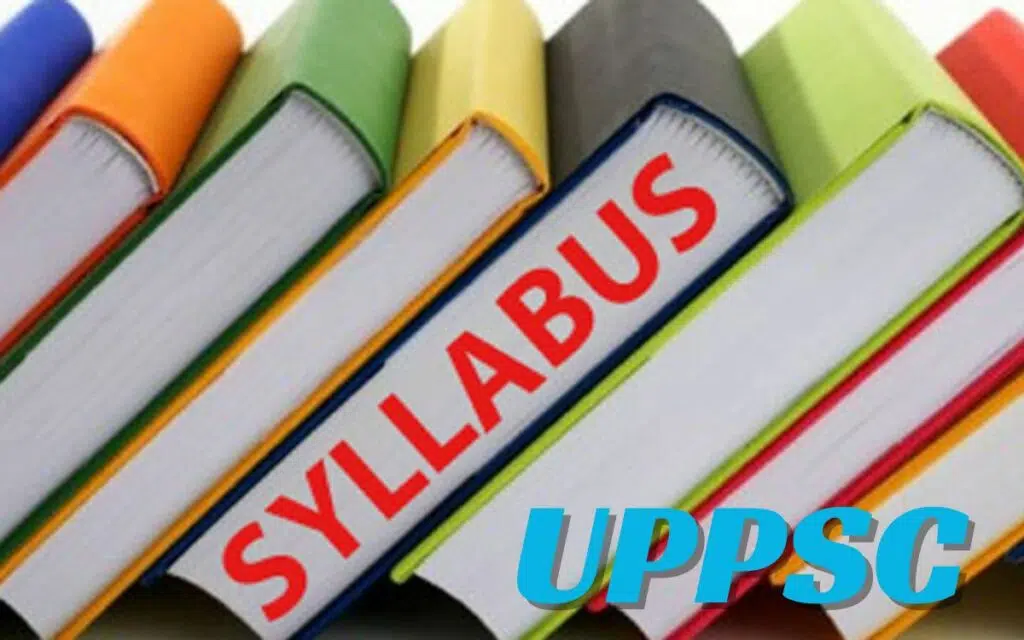
UPPSC Eligibility Criteria 2024:
UPPSC Bharti has been started for 222 seats by UPPSC i.e. Uttar Pradesh Public Service Commission. If this is a recruitment for a government job then there will definitely be an exam. Therefore, know further about UPPSC Eligibility Criteria 2024 and Syllabus in detail.
- Contents
- UPPSC Eligibility Criteria 2024
- UPPSC Syllabus 2024
- UPPSC Prelim Exam Syllabus
- UPPSC Mains Exam Syllabus
- General Studies Paper 1
- General Studies Paper 2
- General Studies Paper 3
- General Studies Paper 4
- General Studies Paper 5
- General Studies Paper 6
UPPSC Eligibility Criteria 2024

UPPSC Eligibility criteria 2024 :
In this, the educational qualification, age, nationality and physical fitness of the candidate are important. For this exam, the age of the candidate should be between 21 to 40 years, and the candidate should have Bachelors or Masters degree for a specific post, only then the candidate is eligible for UPPSC. UPPSC exam is conducted in three stages: Prelims, Mains and Interview.
For higher posts in UPPSC exam, a candidate should have a bachelor’s degree from any good university, percentage does not matter. Final year students can also apply, but they will have to submit a self-attested certificate while submitting the Detailed Application Form (DAF) for UPPSC Main Exam.
UPPSC Syllabus 2024:

UPPSC Prelim Exam Syllabus
| UPPSC Syllabus (Prelims) | |
| Papers | Topics |
| Paper 1: General Studies | Current events of national and international importance, History of India and Indian National Movement, India and World Geography, Indian Politics and Governance, Economic and Social Development, Environmental Ecology, General Issues on Biodiversity and Climate Change, General Science |
| Paper 2: General Studies II (CSAT) | Comprehension, Interpersonal Skills (including Communication Skills) Analytical Ability and Logical Reasoning, Problem Solving and Decision Making, General Mental Ability, Elementary Mathematics (Class X level: Algebra, Statistics, Geometry and Arithmetic) General English (Class X level) General Hindi (10th class level) |

UPPSC Mains Exam Syllabus
General Studies Paper 1
History of culture will cover the major aspects of art forms, literature and architecture from ancient to modern times. Modern Indian History (1757 AD to 1947 AD): Important events, personalities, issues etc. Freedom struggle- its various phases and Important contributors/contributions from different parts of the country. Integration and reorganization within the country after independence (up to 1965 AD) World history will include events from the 18th century to the mid-20th century, such as the French Revolution of 1789, the Revolution , world wars, redrawing of national boundaries, socialism, Nazism, fascism, etc.-their forms and effects on society.
Major features of Indian society and culture. Role of women in society and women’s organizations, population and related issues, poverty and development issues, urbanization, their problems and their solutions. Meaning of liberalization, privatization and globalization and economy, politics and social structure. Their impact on social empowerment, communalism, regionalism and secularism. Distribution of the world’s major natural resources – water, soil and forests – about South and South East Asia with special reference to India. Factors responsible for the condition of industries (with special reference to India).

Major features of physical geography include earthquakes, tsunamis, volcanic activity, cyclones, ocean currents, winds and glaciers. Marine resources of India and their potentials. World’s human migration-refugee problem, focused on India. Boundaries and boundaries of the Indian subcontinent Population and Settlements: Types and Patterns, Urbanization, Smart Cities and Smart Villages.
General Studies Paper 2
Indian Constitution: Historical basis, evolution, features, amendments, important provisions, and fundamental structure; The role of the Supreme Court in the development of the fundamental provisions of the Constitution. Functionality and responsibilities of the Union and the States: devolution of federal structure, powers and finances to the local level, and challenges therein; Role of Finance Commission in Centre-State financial relations. Division of powers, dispute resolution mechanics, and institutions. The emergence and use of alternative dispute resolution mechanisms. Compare the Indian constitutional scheme with that of other major democracies. Parliament and State Legislatures: Structure, functions, conduct of business, powers and privileges, and related issues. Functioning, organization and functioning of the judiciary.
General Studies Paper 3
Economic planning, objectives, and achievements in India. Role of NITI Aayog in pursuit of Sustainable Development Goals (SDGs). Issues of poverty, unemployment, social justice, and inclusive growth. Components of government budgets and financial systems. Main crops, different types of irrigation and irrigation systems, storage, transportation, and marketing of agricultural products, e-technology in assisting farmers. Issues related to direct and indirect agricultural subsidies and minimum support prices, Public Distribution System – objectives, implementation, limitations, reforms, buffer stocks and food security, and issues of technology missions in agriculture.
Role and importance of food processing and related industries in India, location, upstream and downstream requirements, supply chain management. Land reforms in India after independence. Effects of liberalization and globalization on trade, changes in industrial policy, and their impact on industrial development. Infrastructure: Energy, ports, roads, airports, railways, etc. Science and technology development and application in every day life and national security Science and technology policy of India.

Achievements of Indians in science and technology, indigenization of technology. Development of new technologies, transfer of technology, secondary and critical use technologies. Awareness in information and communication technology (ICT), space technology, computers, energy resources, nanotechnology, microbiology, and biotechnology fields. Issues related to intellectual property rights (IPR) and digital rights. Environmental protection and ecology, wildlife conservation.
General Studies Paper 4
Morality and the human gap: Importance, determinants, and consequences of morality in actions, dimensions of morality, morality in private and public relations. Man looks at the values of his family, society, and educational institutions. Learns about the role of values in human action from the lives and teachings of great leaders, reformers, and administrators.
Attitude: content, structure, function, its influence, and relations to thought and behavior; moral and political attitudes; Social Impact; and motivation. Competencies and fundamental values for the civil service: honesty, impartiality, and integrity; objectivity; Dedication, sympathy towards public services; Tolerance and compassion towards the weaker section. Emotional Intelligence – Concept and dimensions, its usefulness and application in administration and governance.

Contributions of ethical thinkers and philosophers from India and the world. Public Service Values and Ethics in Public Administration: Status and Problems, Ethical Concerns and Conflicts in Government and Private Institutions, Laws, Rules, Regulations, and Sources of Ethical Guidance, Accountability, and Governance .Element of integrity in administration: Concept of public service, philosophical underpinnings of governance and integrity, information sharing, and transparency in government. Case studies on the above issues.
General Studies Paper 5
History, civilization, cultural and ancient cities of Uttar Pradesh. Architecture, their importance and maintenance, and museums, collections, and archeology of UP. Cities of India, Uttar Pradesh’s contribution to pre-independence and Western conflicts. Prominent freedom fighters and personalities of UP. Rural, urban and tribal topics of UP: Social structure, festivals, fairs, music, folk dance, literature, languages and dialects/colloquialisms, and social customs and manners of UP.
Political system of UP: Governance, Governor, Chief Minister, Council of Ministers, Rajya Sabha and State Council, Centre-State relations. Public Service, Public Service Commission, Audit, Attorney General, High Court, and more of its influence in UP. Special State Selection Criteria, Official Language, Consolidated Fund and Contingency Fund, Political Parties, and State Election Commission of UP. Local Self-Government: Urban and Panchayati Raj, Public Policy, Related Issues in UP. Good Governance, Ending Corruption, Lokayukta, Citizen’s Charter, E-Government, Right to Information, and Justice Delivery Policy.

Land reform and its impact in UP. Security related issues in UP. Law and Discipline and Civil Defense in UP. Medical and health issues in UP. State education system of UP. Contribution of UP in the development of India. Current news of UP. Implementation of Jal Shakti Mission and other central welfare schemes in UP. NGOs in UP: Issues, Contribution, and Impact. Tourism in UP: Issues and Prospects. Emphasis on innovation in various sectors in UP: Issues and its impact on employment and socio-economic development of the society.
General Studies Paper 6
- Overview of the economy of UP: Key features of the economy and state budget, infrastructure, and importance of physical resources.
- Trade, commerce, and industry in UP.
- UP Government schemes, projects, and programs for people’s welfare, human resources, and skill development.
- Investment in UP: Issues and Impact.
- Public finance and treasury policy, tax and economic reforms, ‘One District, One Product’ policy of UP Government.
- Planning and management of new development and underdevelopment in UP.
- Population, census and population of UP.
- Commercialization of agriculture and production of crops in UP.
- New forest policy of UP.
- Agriculture and Social Forestry in UP.
- Diversity of agriculture, problems of agriculture and their solutions in UP.
- Development index in different areas of UP.
- Geography of UP: Geology, relief, structure, climate, irrigation, minerals, drainage systems, and wildlife.
- National Parks and Wildlife Conservation Areas in UP.
- Transport network in UP.
- Energy resources, infrastructure, and industrial development of UP.
- Pollution and Environmental Problems in UP: Pollution Control Board and its functions.
- Natural Resources of UP – Soil, Water, Air, Forest, Grassland, and Natural Areas.
- Climate change and weather forecasting problems in UP.
- Population and ecology, structure and functions of UP, adjustment; Wildlife and Botany in relation to UP.
- Science and Technology: Its Problems, Progressions, and Efforts in UP.
- Related to pisciculture, viticulture, sericulture, floriculture, horticulture, and plantation in UP.
- Development of public-private partnerships for the development of UP.